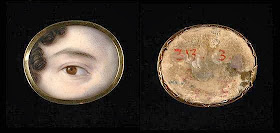These incredibly detailed portrait miniatures, which show only they eye of the "sitter" (the person who would give the portrait to a secret lover, perhaps) were intensely popular for a very brief time from around 1790 to 1830. Lover's Eyes were often created as a token for unsanctioned love, considered very intimate and yet quite mysterious, were delicately rendered on ivory or copper. They were statements of wealth, as you can see, set in various jewels symbolizing marriage, death, infidelity, remembrance, devotion or a secret promise.
Most of the miniature portraits that survive today are unknown, adding more mystery for the collector. The "feverish mania" for these objects were stopped being produced as quickly as they came into fashion, but what is left is how the Lover's Eyes began its popularity in the first place. salon.com explains the portrait's scandalous origin and popularity:
"According to lore, the story of lover’s eyes goes back to the end of the 18th century, when the prince of Wales — who later became George IV — became smitten with a twice-widowed Catholic woman named Maria Fitzherbert. He courted Maria Fitzherbert rather unsuccessfully at first; he kept trying to win her affection and profess his undying love to her, and she wasn't really going to have any of that. Finally, he staged a kind of half-hearted suicide attempt (I think it was more of a cry for help than an earnest effort to take his own life) — and then she reluctantly agreed to marry him.
But shortly thereafter — I think really the next day — she came to her senses and realized what exactly she had done by consenting to marry the prince of Wales, which of course was totally illegal according to the laws (first of all, the king had to consent to the marriage of the heir to the throne, and second, he would never have consented for the prince to marry a Catholic, let alone a twice-widowed Catholic six years his senior).
So Fitzherbert fled to the Continent, trying to escape George’s attention, but he didn’t give up. On Nov. 3, 1785, the prince wrote to Mrs. Fitzherbert with a second proposal of marriage. Instead of sending an engagement ring, as we might expect today, he sent her a picture of his own eye, set in a locket, painted by the miniaturist Richard Cosway, one of the celebrated artists of the day. At the time, they referred to these pieces as “eye miniatures”; today we call them “lover’s eyes,” but that wasn’t a period term — that’s a term coined by the New York-based jeweler Edith Weber, who’s handled a lot of these over the years.
Anyway, George sent a note with this eye miniature, and it said: “P.S. I send you a parcel, and I send you at the same time an eye. If you have not totally forgotten the whole countenance, I think the likeness will strike you.” It’s not known whether it was the letter or the eye that changed Mrs. Fitzherbert’s feelings precisely, but shortly after that, she returned to England and married the prince in a secret ceremony on Dec. 15, 1785. Soon, the fad for these eye miniatures began to catch on — so this episode is, according to legend, the genesis of the eye miniature.
There is some evidence to suggest that these had appeared in France a few years earlier, and that the Brits were only adopting a French invention; I think the jury’s still out. In any event, the love affair between the prince of Wales and Maria Fitzherbert popularized these objects and spawned a fad that lasted well into the 1830s — and even later, past Queen Victoria, who was known to have commissioned a number of these objects during her reign. There are even artists to this very day who are painting lover’s eyes. One is the great-great-grandson of the famous Philadelphia portraitist Thomas Sully; he’s sent me a picture of a miniature he’s working on. Rather than paint on elephant ivory, which of course wouldn't be legal nowadays, he paints on mastodon ivory. He also points out that he usually has them commissioned by faithful spouses, not lovers or mistresses."




































Almanya yurtdışı kargo
ReplyDeleteBelçika yurtdışı kargo
Bulgaristan yurtdışı kargo
Çekya yurtdışı kargo
Danimarka yurtdışı kargo
1SRWK
Moldova yurtdışı kargo
ReplyDeleteMoğolistan yurtdışı kargo
Mikronezya yurtdışı kargo
Mısır yurtdışı kargo
Melilla yurtdışı kargo
JİP2İ
Meksika yurtdışı kargo
ReplyDeleteMayotte yurtdışı kargo
Mauritius yurtdışı kargo
Martinike yurtdışı kargo
Marshall Adaları yurtdışı kargo
0NESVT
Mali yurtdışı kargo
ReplyDeleteMalezya yurtdışı kargo
Maldiv Adaları yurtdışı kargo
Malavi yurtdışı kargo
Makedonya yurtdışı kargo
XOİ
Libya yurtdışı kargo
ReplyDeleteLiberya yurtdışı kargo
Lesotho yurtdışı kargo
Laos yurtdışı kargo
Kuzey Marina Adaları yurtdışı kargo
OV8KG
Kuzey İrlanda yurtdışı kargo
ReplyDeleteKuveyt yurtdışı kargo
Kosta Rika yurtdışı kargo
Kosraey yurtdışı kargo
Güney Kore yurtdışı kargo
CBG
Kongo Halk Cumhuriyeti yurtdışı kargo
ReplyDeleteKongo yurtdışı kargo
Komora yurtdışı kargo
Kolombiya yurtdışı kargo
Kiribati yurtdışı kargo
NYBW
Kırgısiztan yurtdışı kargo
ReplyDeleteKenya yurtdışı kargo
Kazakistan yurtdışı kargo
Katar yurtdışı kargo
Karadağ yurtdışı kargo
CDDHN